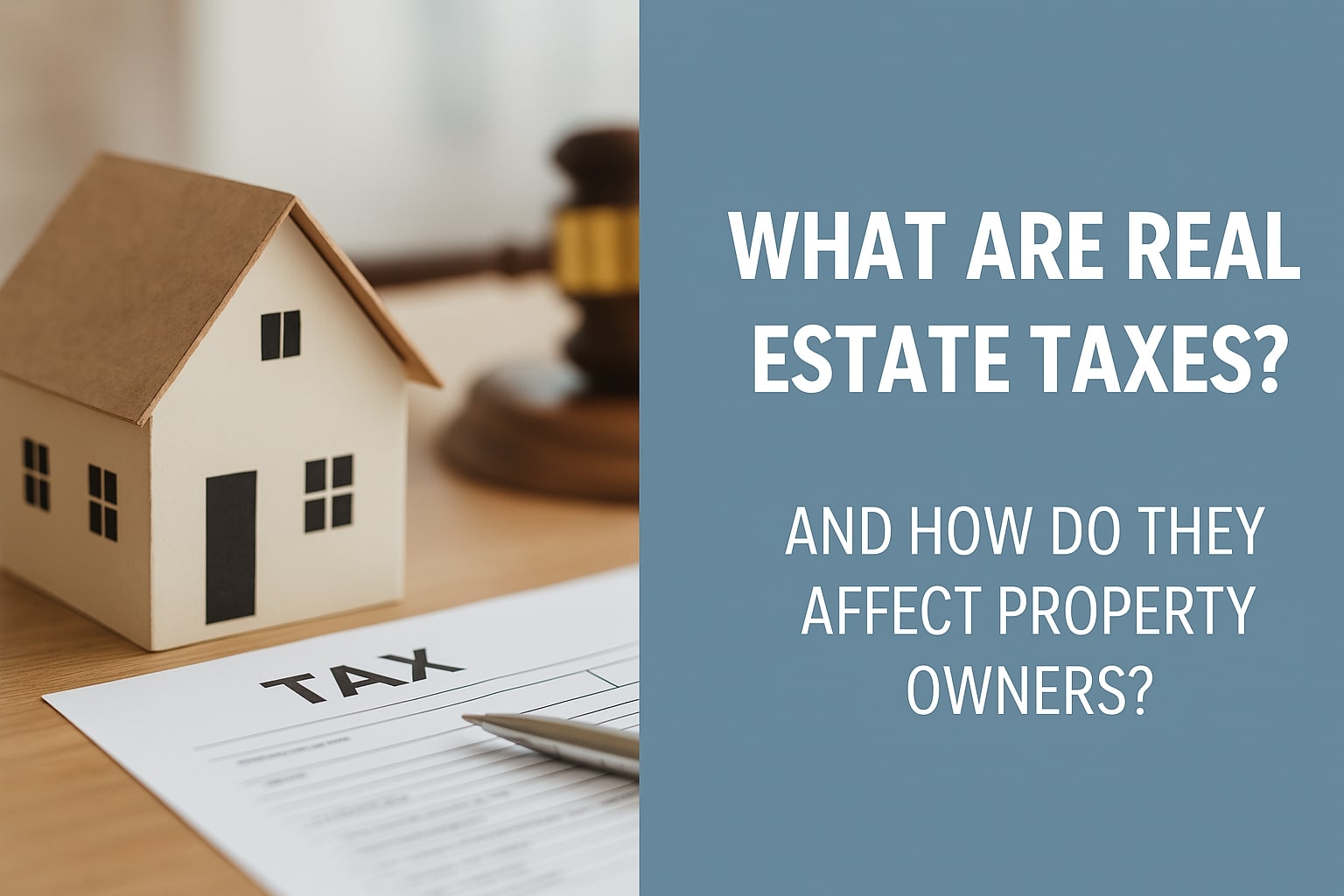What Are Real Estate Taxes and How Do They Affect Property Owners?
Real estate taxes are one of the most important aspects of property ownership. These taxes not only affect the cost...

Real estate taxes are one of the most important aspects of property ownership. These taxes not only affect the cost of owning property but also play a significant role in funding local governments and public services. For many property owners, understanding what real estate taxes are and how they impact their finances is crucial. In this blog, we will dive into what real estate taxes entail, how they are assessed, and how they affect property owners, along with insights into local developments like those from Pantheon Development that could influence tax rates in specific areas.
What Are Real Estate Taxes?
At their core, what are real estate taxes? They are taxes imposed by local governments on property owners. These taxes are typically assessed based on the value of the property you own. Local government entities, including counties, cities, or municipalities, use these taxes to fund various public services such as education, roads, law enforcement, and other essential community infrastructure.
The amount of real estate tax owed depends on the assessed value of the property, which is determined by the local government’s tax assessor. In most cases, property taxes are paid annually, and failure to pay them can result in penalties or, in extreme cases, the property being foreclosed.
Real estate taxes vary by location, as each jurisdiction sets its own tax rate. These rates are often influenced by factors like the demand for local services and the economic needs of the area.
How Are Real Estate Taxes Assessed?
Real estate taxes are usually calculated by multiplying the property’s assessed value by the local tax rate. Here’s a basic example of how the calculation works:
- Step 1: The local tax assessor evaluates the market value of your property. This could involve comparing your property to similar properties in the area, considering its size, location, and condition.
- Step 2: The local government sets a tax rate, often expressed as a percentage (for example, 2% of the assessed value).
- Step 3: The tax rate is applied to the assessed value to determine the amount of tax you owe.
For example, if your property is valued at $300,000 and the local tax rate is 2%, your property tax bill would be $6,000 annually.
The Role of Local Developments in Real Estate Taxes
Local developments can have a profound impact on real estate taxes. For instance, new construction projects by companies like Pantheon Development may increase demand for public services such as schools, roads, and utilities. This increased demand often leads to a rise in property taxes to cover the cost of these services.
However, it’s important to note that development projects can also have a positive impact on property values. When a new development like a shopping center, luxury apartments, or other infrastructure projects is built, it can increase the desirability of the area. As a result, property values may go up, which can lead to an increase in the amount of taxes owed.
Moreover, developments like these often stimulate the local economy by attracting more businesses and residents. The influx of new people may help spread the cost of public services more evenly, potentially lowering the tax burden on existing property owners.
How Do Real Estate Taxes Affect Property Owners?
Real estate taxes can affect property owners in several ways. Here’s how:
1. Financial Burden
For many property owners, real estate taxes are one of the most significant ongoing expenses. These taxes are often paid annually, but many localities also allow for installment plans. In either case, the cost of real estate taxes can be substantial, particularly in high-tax areas. For property owners who live on fixed incomes or have other financial obligations, paying these taxes can be a challenge.
2. Impact on Property Value
In areas where property taxes are high, it could have an adverse effect on property values. Potential buyers may be discouraged from purchasing a home in high-tax areas, which can lead to stagnation or decline in home prices. Conversely, areas with lower property taxes may be more attractive to buyers, which could increase property values in the long run.
3. Ability to Sell Property
High real estate taxes can also affect a property owner’s ability to sell. If the tax burden is too high, potential buyers may be deterred from purchasing the property, which could lead to prolonged time on the market. This could ultimately result in a lower selling price than the owner initially hoped for.
4. Property Tax Deductions
On the flip side, property taxes can also offer some financial relief. In some countries, including the United States, property owners may be eligible for tax deductions related to their real estate taxes, which can reduce their overall tax liability. These deductions can be particularly valuable for property owners who itemize their deductions on their annual tax returns.
5. Tax Exemptions and Credits
In some regions, there are property tax exemptions or credits available for certain groups of people, such as senior citizens, veterans, or those with disabilities. These exemptions can significantly reduce the financial burden of real estate taxes. Property owners should investigate the local tax codes to see if they qualify for any of these benefits.
Strategies for Managing Real Estate Taxes
Given the impact that real estate taxes can have on your financial situation, here are some strategies for managing them:
- Challenge Your Property’s Assessed Value: If you believe your property has been overvalued, you can appeal the assessment. Many local governments offer an appeals process that allows property owners to challenge the assessed value of their property and potentially reduce their tax bill.
- Monitor Local Tax Rates: Keep an eye on local tax rate changes. While you can’t control these rates, understanding when increases are coming can help you plan your finances more effectively.
- Take Advantage of Exemptions and Deductions: Make sure to explore any available property tax exemptions or deductions. This could help you lower your overall tax liability.
- Consider Relocation: If you find that your property taxes are too high in your current location, it may be worth exploring other areas with lower property taxes. Sometimes, relocating to a more tax-friendly area can be a good financial move in the long term.
Conclusion
Real estate taxes are a critical consideration for property owners and can have a significant impact on finances. By understanding what real estate taxes are, how they are assessed, and how they can be influenced by local developments like those from Pantheon Development, property owners can better prepare for the financial obligations they face. It’s essential to stay informed about tax rates, potential exemptions, and local economic developments to manage your property taxes effectively.







